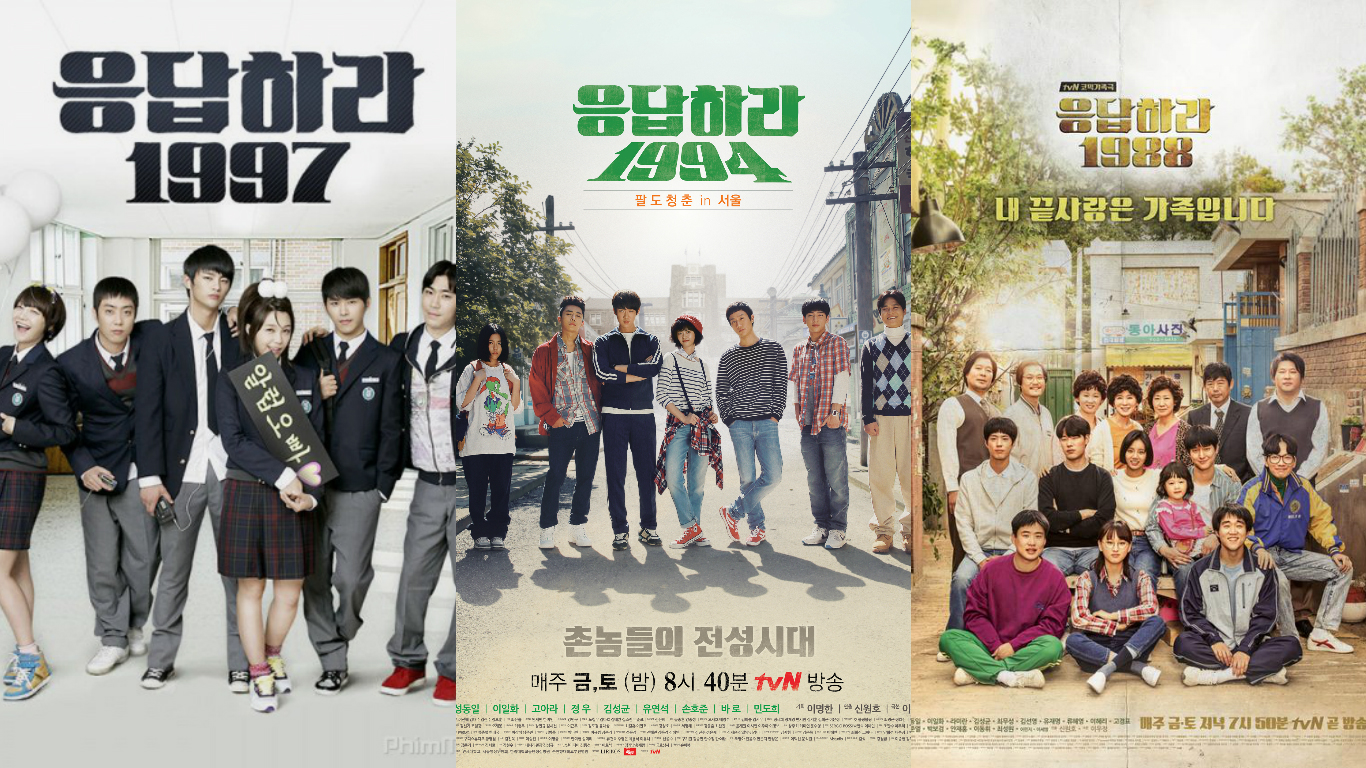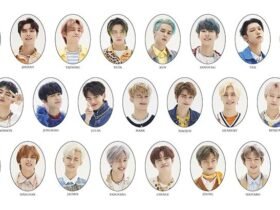No products in the basket.

Today we’ll be looking at three great shows that came out as part of the ‘Reply’ series, TvN’s lighthearted romance slice-of-life dramas that everyone should watch if you have even the slightest interest in K-dramas.
I’ve been feeling a little nostalgic of my teenage years lately. Maybe because I feel like I’ve been grounded or maybe because I miss the simplicity of heading to a familiar place and meeting my friends.
The feeling of nostalgia, about our youth, our first loves, our friendships, is exactly what the ‘Reply’ series center around (and one of the reasons they were all immensely popular). There are a few threads that are common in all three shows, but each one tells its own story.
The common ground
At the center of each show we have the female protagonist and her parents – portrayed in all three series by the lovable duo Sung Dong-il and Lee Il-hwa-, and their daily lives and struggles. Their timeline moves back and forth from the titular year to today (today being the year each show came out), and through the flashbacks the audience is made to guess at who the protagonist’s husband ended up being. Each show plays this to a different degree, but the guessing game is common plotline in all three. There’s also a running gag where Lee Il-hwa’s characters are always cooking insane amounts of food.
However, don’t think for a second that all there is to these dramas is cutesy romance. They’re so full of humour, and heart, and the producers did such a great job at recreating those times, that it really feels like we stepped into a time machine.
Reply 1997
The first installment of the series, Reply 1977, came out in 2012, and follows Busan teenager (one of the few dramas featuring such strong accents!) and H.O.T. mega-fan Sung Shi-won (Jung Eun-Ji) and five of her friends. It starts at a high-school reunion in Seoul in the present day, where they meet and start reminiscing about old times. She says her husband -name omitted obviously- is on his way, as the rest are wondering about him. A couple of people are missing, so this is not helping us figure out his identity. Of course, that’s the point.
The characters
We’re transported back in time, and we start getting proper introductions to the group. First we have Yoon-jae (Seo In-guk), Shi-won’s childhood friend who seems to hang around her house a lot, and Joon-Hee (Hoya), her other best friend, the two hottest guys in school. Shi-won’s BFF Yoo-jung (Shin So-yul), is a fan of H.O.T.’s rival boyband Sechs Kies, particularly their leader Eun-Ji-Won. She eventually starts dating transfer student Hak-chan who’s teased about looking older, and is played by (ha!) Eun-Ji-Won. Just for good measure, Yoon-Jae’s older brother, Tae-Woong (Song Jong-ho) is also thrown in the mix.
The intense fan culture that emerged in the nineties is obviously central to Shi-won’s teenage years. She even writes lemon fanfics about her idols. Her friends call her ‘Tony’s wife’, and she has a major falling out with Yoo-Jung over her becoming a fan of a different boyband! Relatable content is relatable, BSB or N-Sync? Trick question, the answer was obviously BSB. That said, this show, much like the next two, was praised for being well-researched. They’re also chock-full of era-specific references and tidbits.
Her parents’ interactions with her and each other are equally memorable. Their bickering, their love for each other, and their worry about their child, is all too familiar and heartwarming.
It only sort of becomes obvious who the husband is right before it’s officially revealed. The drama tries to confuse you constantly, and succeeds.
This show took me back to my school days, scribbling the names of my idols and lyrics of my favourite songs in my notebooks, exchanging notes with my BFF under the desk, talking about who’s crushing on whom. It was a pleasure to watch and has excellent re-watch value, despite the ‘mystery husband’ being a mystery no more.
Reply 1994
The second installment which came out in 2013, brings us to a small boarding house in 1994 Seoul, where six college students from around Korea are staying, run by Sung Na-jung’s (Go A-ra) parents. The family is originally from Masan, and with all the lodgers being from different places, the accents are heavy with this one too.
The series picks up in the present day, when Na-jung unearths a videotape of her wedding. Conveniently, the video shoots the groom’s legs, and just when it’s about to pan up to his face, we cut to a loud family scene in 1994.
The device employed here to obscure the husband throughout the series is calling all the guys by a nickname, while their names are revealed later. Despite that, all it took was a careless subtitling job (don’t watch this on Netflix) to spoil the surprise. That said, it wasn’t that mysterious in this case, as Na-jung carries a very obvious torch for one of the guys from early on. They also somehow decided to translate one of the nicknames in the subs, but use the rest in Korean, which was super confusing.
The characters
The main male leads are ‘Sseureki’ or ‘Trash’ (Jung Woo), who grew up with Na-jung and her brother and has a sibling-like relationship with her, and ‘Chilbong’ aka Seven-Hits (Yoo Yeon-sok), a freshman who’s also the number one pitcher of his University’s baseball team. As ‘Trash’ might imply, the guy is an absolute slob.
The only other girl in the dorm is Yoo-jin (Min Do-hee), a seemingly quiet and awfully potty-mouthed student in the same major as Na-jung. They bond over their shared sasaeng-ness; She often camps outside a singer’s house while Na-jung is obsessed with a basketball player from her University’s team (#cannot_relate). It’s all slightly disturbing.
Once again, alongside our heroes’ lives, we observe key historical and cultural events that shaped the country, like the emergence of K-pop (woot woot!) and the Korean Basketball league. Through the father who works as a baseball coach, we also get a ton of references to famous Korean baseball athletes (and I had to google all of them because I know little about baseball, and even less about Korean baseball).
I have to admit that I personally couldn’t get as into this one as I did the other two, so other than an intense second-lead syndrome I don’t have many strong lingering feelings about it. While it shares the same kind of humour and soul as 1997 and 1988, I didn’t connect to the characters as much- maybe it was all the sports? Or the super obvious husband.
That said, anyone who ever moved from the countryside to a huge metropolitan city, will relate to the fish-out-of-water feeling the characters experience when they move to Seoul. Other than the nostalgia factor, this was the second biggest pull of the show, which was a huge hit, and is an easy recommendation as well.
Reply 1988
They saved the best for last. ‘Reply 1988’ aired in 2015, is one of the highest rated cable dramas ever, and one of my absolute favourites.
It revolves around five friends and their families who live in the same street in Seoul’s Dobong-dong district. Ten minutes into the first episode is all it takes to fall head over heels with this neighbourhood.
The opening flashes images of the 1988 Seoul Olympics, the student riots, people in denim from head to toe, Walkmans (for the under 20s: it was a cassette tape player. Now I feel old.), arcade games, popular actors (teacher Jimena! OMG they watched Carousel in Korea too!) and movies, while the present-day protagonist narrates. The final movie that flashes is ‘A better Tomorrow 2’, and we’re suddenly in a room where the five young friends are huddled in front of the TV set watching this movie.
The characters
The narrator introduces us to the kids, and where they live on the block one by one. First there’s Ruy Dong-ryong ‘the Counsellor’ (Lee Dong-hwi), who’s a bit of a clown. Then Kim Jung-hwan (Ruy Jun-yeol), stoic and sarcastic. Young genius Baduk player Choi Taek (Park Bo-gum <3) is introduced as the owner of the room, whose aloofness and overall naivety is a point of concern for his friends. Sung Sun-Woo (Go Kyung-pyo) is the well-mannered normal one. Finally, we meet our protagonist, Sung Deok-sun *not related to Sun-woo*, a middle child, loud, and not very studious girl portrayed by Hyeri.
The clock sounds and their parents start yelling for them to get home for lunch and give them plates of side-dishes to share with the neighbours. A round-robin starts, and they all have a bit of everything by the time they finally sit down to eat.
This scene sets the tone in such a spectacular manner. We meet each family and get to feel their dynamic through how they normally eat. For example, Taek’s single father has a simple meal prepared, but by the time they start eating, after the round robin of side dish exchanges from the neighbourhood aunties, they have a table full of different things. Most importantly however, we understand that this story is going to be heartwarming as hell.
Guessing between the tears and the laughter
The husband-guessing game was never as difficult as it is here. Part of the reason is that it’s not the focus of the story at all. Instead we see the very real and very relatable feelings and hardships each family goes through. From Sun-Woo’s poor mother trying her best to convince her mother that she’s not in financial trouble (but mom knows), to Jung-Hwan’s mom struggling to connect with her son, or Deok-sun’s parents worrying about their rebellious and stubborn first-born daughter Bo-ra. Happiness, grief, worry, love, pain, it’s all here, the full human experience.
This show makes you bawl your eyes out, but has you laughing even harder the next minute. More than the abundant pop culture references you might get anyway, you actually learn a lot about major events in Korean political history.
I cannot sing the praises of Reply 1988 enough. It will make you want to call your parents and tell them you love them and also tell them to watch this show; I know I did.
The Reply Series
Each show has something special to offer. While I clearly have my own preference, it’s the common element of nostalgia, of youthful memories, and of experiences hardly specific to any of the drama’s characters, but that feel universal in one way or another. That’s why the ‘Reply’ series resonated with viewers of all ages across the world. It’s what made them instant classics. If you haven’t already watched one or all three, you’re in for a treat. 🙂
What’s your reaction?
Love0
Sad0
Happy0
Angry0
Wink0
- Pingback: What A K-Drama! - Slice of Life Dramas - thekmeal
- Pingback: What A K-Drama! - Bromances in K-Dramas - thekmeal
- Pingback: Actor Spotlight: Jung Hae-in - thekmeal
- Pingback: Actor Spotlight: Heo Sung-Tae - thekmeal
- Pingback: [Review] Mad For Each Other - thekmeal









5 Comments